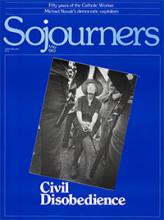Early on the morning of July 5 last year, nine peace activists went to General Dynamics' Electric Boat nuclear submarine factory in Groton, Connecticut, to begin the process of disarming the Trident submarine. We named ourselves the "Trident Nein" for two reasons: to demonstrate our resounding "No" to Trident, and to express through the German word our deep solidarity with the European disarmament movement.
There are many moral and legal reasons for our decision to hammer and pour blood on the Trident, a weapon comparable to 2,040 Hiroshima-size bombs. While our nonviolent witness against Trident was primarily a moral repudiation of the nuclear arms race and a call to affirm the sacredness of all life, it also represents in part a legal indictment of this mass murder system.
The tragic reality is that official U.S. military policy holds that nuclear weapons will be used if national security interests deem it necessary. The United States could launch a nuclear war tomorrow and it would be legally sanctioned, according to U.S. principles.
However, international law accords ranging from the Hague conferences of 1899 and 1907 to the Nuremberg Charter of 1945 have, for as long as governments (including our own) have signed them, consistently prohibited weapons of indiscriminate or mass destruction. Nuclear weapons inherently fit this definition.
In 1961 the U.N. General Assembly declared the use of nuclear weapons a direct violation of the charter of the United Nations. A section of the resolution states: "The use of nuclear and thermonuclear weapons would exceed even the scope of war, and cause indiscriminate suffering and destruction to humankind and civilization, and. as such, is contrary to the rules of international law and to the laws of humanity."
Read the Full Article

